Starting an online business can be an exciting way to turn your passion into profit. With the right tools, you can set up and run a successful venture from the comfort of your home. These tools can help you manage tasks, reach customers, and grow your business efficiently.
The top 10 tools for starting a profitable online business can make your entrepreneurial journey smoother and more successful. From website builders to marketing platforms, these resources are designed to help you tackle various aspects of running an online business. By using them, you can focus on what matters most – creating value for your customers and growing your brand.
1) Shopify
Shopify is a top choice for starting an online business. It’s a user-friendly platform that lets you create and manage your ecommerce website with ease.
You don’t need coding skills to use Shopify. The platform offers many customizable templates to make your store look professional.
Shopify handles important aspects like web hosting and security. This lets you focus on selling products and growing your business.
You can add various features to your Shopify store. These include payment processing, inventory management, and shipping tools.
Shopify also provides marketing tools to help you promote your products. You can use email campaigns, social media integration, and SEO features.
The platform offers different pricing plans to fit various business needs. You can start with a basic plan and upgrade as your business grows.
Shopify has a large app store with tools for sales, marketing, and customer service. These apps can help you boost your store’s performance.
With Shopify, you can sell products on multiple channels. This includes your website, social media platforms, and online marketplaces.
2) WooCommerce
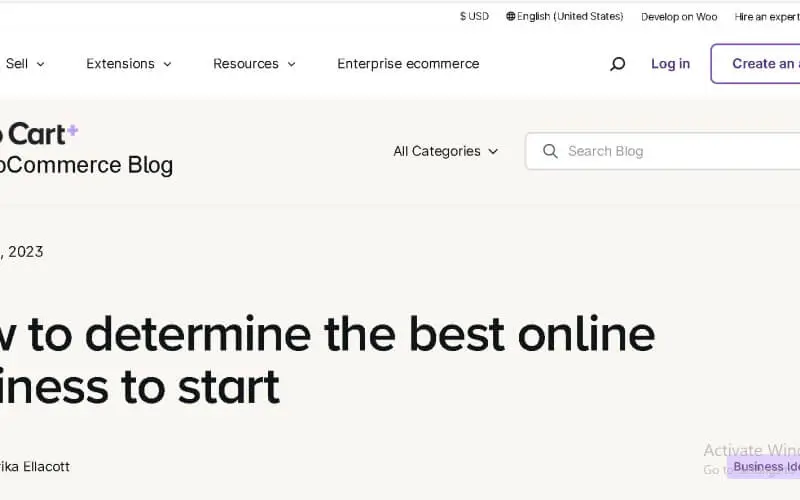
WooCommerce is a powerful ecommerce plugin for WordPress. It’s free and open-source, making it a great choice for new online businesses.
You can easily set up an online store with WooCommerce. It offers many features to help you sell products and manage your business.
WooCommerce works with most WordPress themes. This lets you create a unique look for your store without much effort.
The plugin handles payments, shipping, and inventory. It also offers reports to track your sales and growth.
You can add extra features with extensions. These let you customize your store to fit your needs.
WooCommerce is flexible and scalable. It works well for small businesses and can grow as your business expands.
The large WooCommerce community provides support and resources. This can help you solve problems and learn new skills.
You’ll find many tools and plugins that work with WooCommerce. These can help improve your store’s performance and features.
3) Bluehost Hosting

Bluehost is a top choice for starting an online business. It offers reliable web hosting services that can help you launch your website quickly and easily.
With Bluehost, you get a free domain name for the first year. This saves you money when setting up your online presence. They also provide easy WordPress installation, making it simple to create a professional-looking site.
Bluehost offers different hosting plans to fit your needs. You can choose from shared hosting, VPS, or dedicated servers. As your business grows, you can upgrade your plan without hassle.
Security is a key feature of Bluehost hosting. They provide SSL certificates to keep your website and customer data safe. This builds trust with your visitors and helps protect sensitive information.
Bluehost also offers e-commerce tools to help you set up an online store. You can easily add shopping cart features and payment gateways to your site. This makes it simple to start selling products or services online.
Their customer support is available 24/7. If you run into any issues, you can get help quickly. This ensures your website stays up and running smoothly.
4) Canva Pro

Canva Pro is a powerful tool for creating professional-looking designs. It offers many features to help you start and grow your online business.
With Canva Pro, you get access to millions of premium images, fonts, and templates. This saves you time and money on graphic design.
You can create eye-catching social media posts, logos, and marketing materials quickly. Canva Pro’s user-friendly interface makes it easy for beginners to use.
The Brand Kit feature lets you save your colors, fonts, and logos. This helps keep your branding consistent across all designs.
Canva Pro allows you to resize designs with one click. You can easily adapt your content for different platforms and formats.
You can create marketing videos using Canva’s video editor. This feature helps you make engaging content for your business.
Canva Pro offers team collaboration tools. You can work with others on designs in real-time, making group projects easier.
The Magic Resize feature automatically adjusts your designs for different social media platforms. This saves you time when posting across multiple channels.
5) Google Analytics

Google Analytics is a must-have tool for any online business. It helps you track and understand your website traffic.
You can see where your visitors come from and what they do on your site. This info lets you make smart choices about your business.
Google Analytics collects and sorts data from your website. You can use this to improve your marketing and boost sales.
The tool is free and easy to set up. You just need to add a small code to your website.
With Google Analytics, you can track important things like:
- How many people visit your site
- Which pages they look at most
- How long they stay on your site
- What devices they use
You can also make custom reports to focus on the data that matters most to your business.
By using Google Analytics, you can find out what’s working and what’s not. This helps you make your website better and grow your online business.
6) Mailchimp
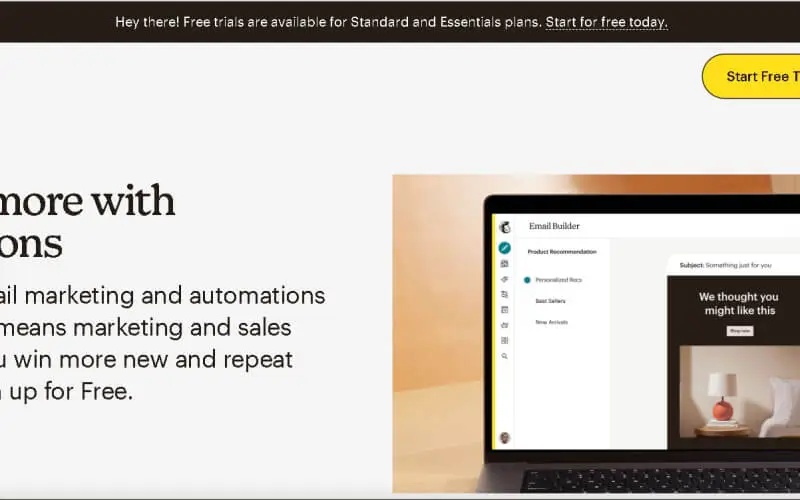
Mailchimp is a powerful tool for starting and growing your online business. It’s best known for email marketing, but it offers much more.
With Mailchimp, you can create and send professional-looking emails to your customers. You can design eye-catching newsletters, promotions, and updates without any coding skills.
The platform also helps you manage your contact list. You can segment your audience and send targeted messages to different groups.
Mailchimp provides analytics to track how your emails perform. You’ll see open rates, click-through rates, and other useful data.
Beyond email, Mailchimp offers tools for building landing pages and even simple websites. This can be a great starting point if you’re just launching your online business.
The platform integrates with many e-commerce systems. This makes it easy to connect your online store and automate marketing tasks.
Mailchimp has a free plan for small businesses just starting out. As your business grows, you can upgrade to more advanced features.
With its user-friendly interface and wide range of features, Mailchimp can be a valuable asset for your online business.
7) Hootsuite
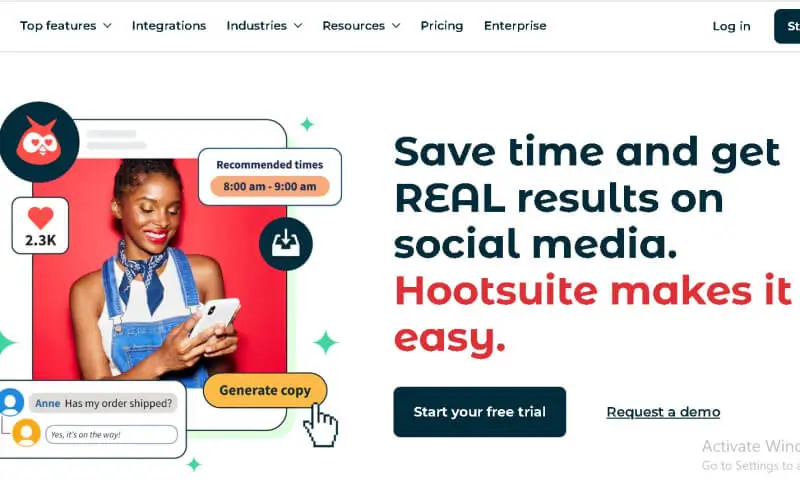
Hootsuite is a powerful social media management tool that can help you grow your online business. It lets you manage multiple social media accounts from one dashboard.
With Hootsuite, you can plan and schedule your social media posts in advance. This saves you time and keeps your profiles active even when you’re busy.
The platform offers useful features like content curation and team collaboration. You can find and share interesting content with your followers easily.
Hootsuite also provides analytics tools to track your social media performance. You can see which posts are doing well and adjust your strategy accordingly.
For businesses just starting out, Hootsuite offers a free plan with basic features. As your business grows, you can upgrade to paid plans with more advanced tools.
Using Hootsuite can help you build a strong social media presence for your online business. It makes managing your accounts simpler and more efficient.
8) Ahrefs
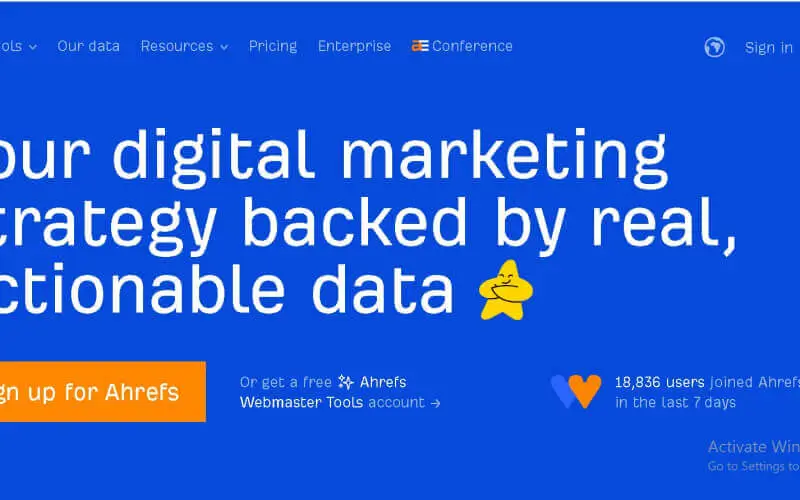
Ahrefs is a powerful tool for online business owners. It helps you research keywords, analyze competitors, and track your website’s performance.
With Ahrefs, you can find profitable niches for your online business. It shows you search volume and difficulty for keywords, helping you target the right terms.
You can also use Ahrefs to check your backlink profile. This lets you see who’s linking to your site and find new link-building opportunities.
The tool offers content ideas too. You can see what topics are popular in your niche and create content that attracts visitors.
Ahrefs helps you track your website’s rankings in search engines. This makes it easier to see if your SEO efforts are working.
While Ahrefs isn’t free, many online business owners find it worth the investment. It can save you time and help you make data-driven decisions for your business growth.
9) QuickBooks Online

QuickBooks Online is a vital tool for new online businesses. It helps you manage your finances and keep track of your income and expenses.
This cloud-based accounting software offers four different plans to fit your needs. You can choose from Simple Start, Essentials, Plus, or Advanced.
With QuickBooks Online, you can easily create invoices, track sales, and manage bills. It also helps you prepare for tax season by organizing your financial data.
The software connects to your bank accounts and credit cards. This feature saves you time by automatically importing transactions.
QuickBooks Online allows you to collaborate with others, like your accountant or business partner. You can give them access to your financial information securely.
The platform offers mobile apps for both iOS and Android. This means you can manage your finances on the go, perfect for busy entrepreneurs.
QuickBooks Online integrates with many other business tools. This makes it easier to sync data across different platforms you might use.
By using QuickBooks Online, you can gain better insights into your business’s financial health. This knowledge can help you make smarter decisions as you grow your online venture.
10) Grammarly
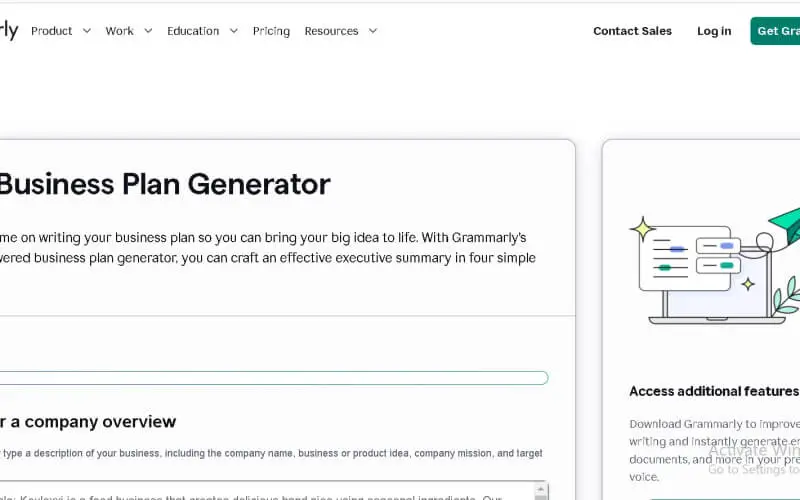
Grammarly is a must-have tool for any online business owner. It helps you write clear, error-free content for your website, emails, and social media posts.
You can use Grammarly to check your spelling, grammar, and punctuation. It also suggests ways to improve your writing style and tone.
The free version offers basic checks, while the paid version provides more advanced features. These include vocabulary suggestions and plagiarism detection.
Grammarly works as a browser extension, desktop app, and mobile keyboard. This means you can use it wherever you write.
For businesses, Grammarly offers a team plan with extra features. It includes an AI-powered business plan generator to help you create effective executive summaries.
Clear communication is key to building trust with customers. Grammarly helps ensure your business writing is professional and polished.
By using Grammarly, you can save time on proofreading and focus on growing your online business. It’s a valuable tool for improving your writing and presenting a professional image to clients.
Understanding the Basics of Online Business
Starting an online business needs careful planning and smart choices. You’ll need to pick the right business model and understand your target market.
Business Models
When starting an online business, you have many options. You could sell products, offer services, or create digital content.
E-commerce is a popular choice. You can sell physical items or digital products like ebooks or courses. Dropshipping lets you sell without holding inventory.
Service-based businesses are another option. You might offer freelance writing, web design, or consulting. These often have lower startup costs.
Content creation can also be profitable. This includes blogging, podcasting, or making videos. You can earn through ads, sponsorships, or selling your own products.
Market Analysis
Before launching your business, you need to know your market. This helps you make smart decisions and avoid costly mistakes.
Start by identifying your target audience. Who are they? What do they need or want? Understanding this helps you create products or services they’ll buy.
Look at your competitors too. What are they offering? How can you do better? This info helps you find your unique selling point.
Use online tools to research market trends. Google Trends shows what people are searching for. Social media can give insights into customer preferences.
Don’t forget to test your ideas. Start small and get feedback. This can save you time and money in the long run.
Building a Strong Online Presence
A strong online presence helps you reach customers and grow your business. It lets you showcase your brand and connect with your audience.
Creating a Website
Start by choosing a domain name that reflects your brand. Pick a reliable web hosting service to keep your site online. Use a user-friendly platform like WordPress or Squarespace to build your site.
Make sure your website looks good on all devices. Create clear, easy-to-navigate menus. Add high-quality images and videos to engage visitors.
Write compelling content that shows your expertise. Include a blog to share useful information with your audience. Add customer testimonials to build trust.
Optimize your website for search engines. Use relevant keywords in your content. Create meta descriptions for each page to improve click-through rates.
Social Media Marketing
Pick the social media platforms where your target audience spends time. Create profiles that match your brand’s look and feel.
Post regularly to keep your followers engaged. Share a mix of content:
- Helpful tips and advice
- Behind-the-scenes glimpses of your business
- Customer success stories
- Product updates and announcements
Use hashtags to increase your reach. Engage with your followers by responding to comments and messages promptly.
Run social media ads to expand your audience. Target specific demographics and interests to reach potential customers.
Monitor your social media performance. Use analytics tools to track engagement and adjust your strategy as needed.
Effective Financial Management
Good money habits are key for online business success. Smart budgeting and diverse income sources help your business grow and stay stable.
Budgeting
Start by tracking all your business expenses. Use a financial management tool to record spending on hosting, software, and marketing. Set clear spending limits for each category.
Create a monthly budget. Plan for regular costs like subscriptions and occasional expenses such as equipment upgrades. Always set aside some money for unexpected costs.
Review your budget often. Look for areas where you can cut back if needed. Be ready to adjust your plan as your business grows and changes.
Revenue Streams
Don’t rely on just one way to make money. Try to have at least 2-3 different income sources for your online business.
Some options include:
- Selling products
- Offering services
- Affiliate marketing
- Advertising
- Subscriptions
Test new income ideas regularly. Keep the ones that work well and fit your business goals. Drop those that don’t perform or take too much effort.
Track each revenue stream separately. This helps you see which ones bring in the most money. You can then focus more on your top earners.
Frequently Asked Questions
Starting an online business requires specific tools and strategies. Many aspiring entrepreneurs have common questions about the process. Let’s address some key concerns and provide practical advice.
What are the essential tools needed to start an online business?
You need a reliable e-commerce platform, web hosting, and design tools. Shopify is great for beginners. WooCommerce works well with WordPress sites. Bluehost offers affordable hosting. Canva Pro helps create eye-catching visuals.
Which online business platform is best for beginners to maximize profitability?
Shopify is often the top choice for new online entrepreneurs. It’s user-friendly and has built-in features to boost sales. WooCommerce is another good option if you’re familiar with WordPress.
What steps should one follow to launch a successful online business?
Start by vetting your idea. Research your market and competitors. Choose a business structure and register your company. Set up your website and online store. Create a marketing plan to attract customers.
Can you list some of the most popular tools utilized by thriving online businesses?
Thriving online businesses often use Shopify or WooCommerce for their stores. They rely on Google Analytics to track website performance. Many use Canva Pro for creating marketing materials and social media content.
How can someone balance starting an online side business while working full-time?
Set a strict schedule for your side business. Dedicate specific hours each day or week. Use time-saving tools like Shopify for quick setup. Automate tasks where possible to maximize your limited time.
What are some examples of online side business ideas that have the potential to be profitable?
Voice-over services can be lucrative if you have a good speaking voice. Creating and selling online courses is another option. Dropshipping allows you to sell products without holding inventory. Print-on-demand services let you design custom products.
This article is for informational purposes only and not financial advice. Please do your own research or consult a professional before making financial decisions. The writer and publisher bear no responsibility for any potential losses or damages. Any reliance you place on information from onlinemoneytrendz.com is strictly at your own risk. Please read our Terms of Service for more information





